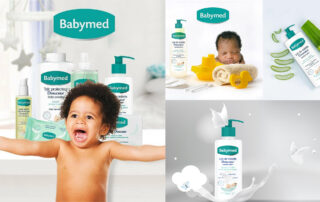How to build a baby skincare brand
After two years of managing Babymed and Bouchou’s baby skincare brand presence, I have come to understand what mothers are looking for when they choose a skincare product for their baby.
When it comes to Baby Skincare, your major target audience are mothers, and they are more likely to trust a product that is natural or organic. For some, buying a well-known brand with a strong reputation is a more important purchase motivator than price.
I have also noticed a pattern, most parents will most likely go for a brand that was used on them when they were children, and this explains the reason why Johnson’s baby is still the market leader. This is mostly because of their strong brand heritage.
If you are very observant, you will see words like hypoallergenic and fragrance-free being associated with baby skincare. Hypoallergenic simply means that the product is unlikely to cause an allergic reaction.
Fragrance-free! Is that such a good thing? Most skincare products out there contain a decent amount of fragrance, and everyone loves a good-smelling baby. The truth is that when manufacturing or buying a baby skincare brand, it’s best to keep it fragrance-free. Fragrances can cause an allergic reaction, including rashes and breathing problems. Some babies are sensitive to products with fragrances.
If you intend to go into this niche, some products to consider are baby bath Care, baby creams, baby cream, baby shampoo, baby oil: baby massage oil, baby hair oil, baby powder, baby lotions, Kids Toothpaste, Baby Petroleum Jelly, and Baby Wipes.
Branding and packaging play a major role to determine how successful to brand will be. You should never try to cut corners with this. Work with an expert that understands branding and packaging.
The first step to this process is to get a befitting name for your brand. A very good example I love is the babyganics,you can easily tell that this is a descriptive name that was formed from the words (Baby and Organics)

The name already signifies that products are made with organic ingredients. This alone can instill trust in the mind of your consumers. Another distinctive factor about the name is that it’s short and memorable.
I wrote a very elaborate article about naming here, feel free to check it out. Another thing I love about the brand is their choices of color and how they were able to incorporate vibrant characters into their packaging. I also noticed that they have the name babyganics on the major social media platform.

The level of consistency and attention to detail is outstanding. It is also clearly written on their website that the product is made without parabens, phthalates, or synthetic fragrances. The product comes in custom unusual shapes which is a huge plus because it will help it stand out from the crowd.
The same goes for the brand Babymed. The name is simply a combination of two words ( Baby+Medical) – Which I think is brilliant.
People tend to trust anything that feels or sounds medical because they feel it is safe and well tested. If you also look at the Babymed color scheme you will see it embodies the medical color palette and a lot of white spaces were used in the product design, therefore giving it a minimalist look.
All these product design attributes help build the right perception in the mind of your prospects. It’s not always enough to get the formulation right, getting the branding right will play a key role in your product adoption. The packaging will attract the user and content is what will keep the user.
Pay close attention, when it comes to a baby skincare brand, try as much as possible to stick to a typographic logo. Typographic logos builds recognition and make your brand name memorable. For your typographic logo to stand out, your brand name needs to be short and simple. 
I strongly suggest you get a brand identity manual, where your font style, color guide, and patterns are well specified. Doing this will help keep you consistent throughout your brand-building journey.
The final part is, how do you choose to manufacture your brand. To manufacture at scale you will be needing a factory and that does not come cheap – if you have the funding, by all means, go for it. If you don’t you can do a private label. There are tons of manufactures in China, with so many amazing products, do your due diligence before picking one. If you find this article interesting feel free to drop a comment.






